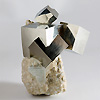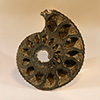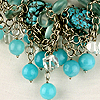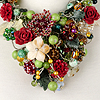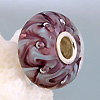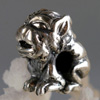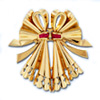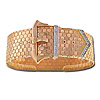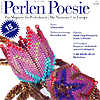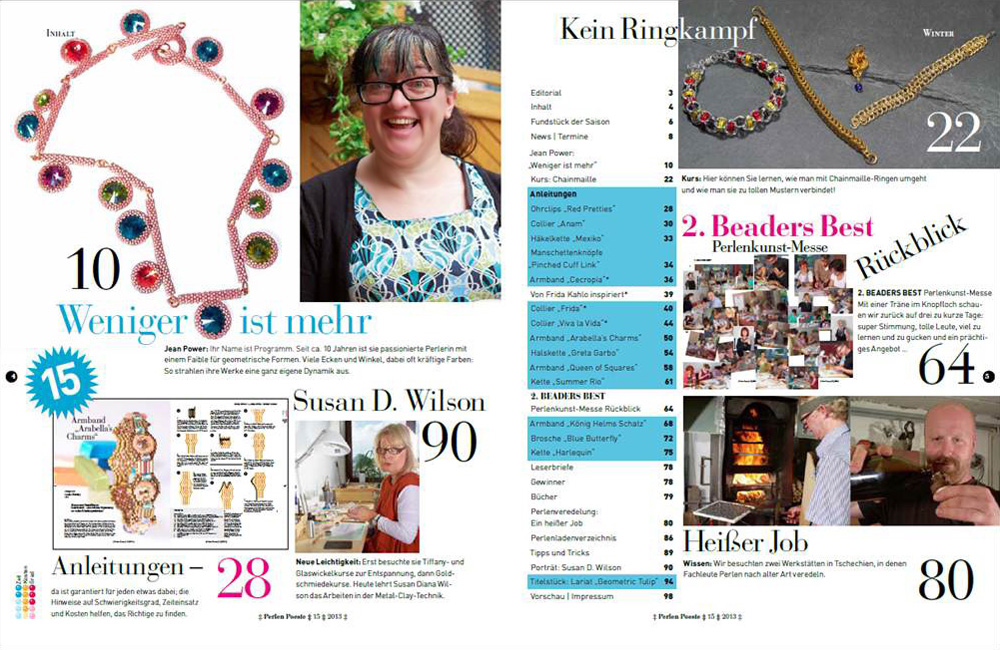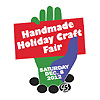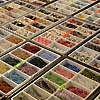November, 2012

From MyLovelyBeads.com TeamRead in the November issue:
Pyrite - fool's gold
Contact us with any questions at
info@mylovelybeads.com.
New in Fashion Colorworks 2013 Bridge jewelry by Luis Vallejo Battle of the BeadSmith - 2013 Pandora and Silver beads by M. Ivanov Retro style and Retro jewelry Perlen Poesie Magazine. Issue 15 December upcoming events Best regards, MyLovelyBeads.com Team
|
Pyrite - fool's goldToday we'll talk about gold, more precisely, about Fool's Gold. The mineral pyrite, or iron pyrite, is an iron sulfide. This mineral's metallic luster and pale brass-yellow hue have earned it the nickname "fool's gold" because of its superficial resemblance to gold. The color has also led to the nicknames "brass", "brazzle" and "Brazil", primarily used to refer to pyrite found in coal. The name pyrite is derived from the Greek PURITES that means "of fire" or "in fire". In ancient Roman times, this name was applied to several types of stone that would create sparks when struck against steel; Pliny the Elder described one of them as being brassy, almost certainly a reference to what we now call pyrite. By Georgius Agricola's time, the term had become a generic term for all of the sulfide minerals. Pyrite is usually found associated with other sulfides as well as in coal beds, and as a replacement mineral in fossils. Despite being nicknamed fool's gold, pyrite is sometimes found in association with small quantities of gold. It is distinguishable from native gold by its hardness, brittleness and crystal form. Natural gold tends to be irregularly shaped, whereas pyrite comes as either cubes or multifaceted crystals. Pyrite is mined in Norway, Spain, Italy, Canada, USA, Japan, Russia; it is not a separate subject of development and is produced from sulfide ores during enrichment of the related more valuable minerals. Pyrite is used to make marcasite jewelry (though marcasite is another mineral, sometimes called white iron pyrite). In the late medieval and early modern eras the word "marcasite" meant both pyrite and marcasite (and iron sulfides in general). Modern scientific definition for marcasite dates from 1845, it is not used as a gem due to its brittleness. Marcasite jewelry, made from small faceted pieces of pyrite, often set in silver, was popular in the Victorian era. Carved pyrite and pyrite beads are also used in jewelry today. |
|
New in Fashion Colorworks 2013So, we started Fashion Colorworks 2013! The contest entry must use the three colors of one of the palettes shown on the contest page; there are three possible color combinations. We accept entries in three categories:
• Seed Bead Jewelry: Entries include
jewelry and jewelry-related objects. Each entry
must be not less than 50 percent seed beads.
There are no entry fees, the contest is open to
participants worldwide, and judging is by
photographs. To stimulate beginners and other
contest participants, in 2012 contest we added
five new prizes:
Fofinhas Perlenshtuebchen
is sponsoring three special prizes 50 euros each:
• Finished Jewelry: Each entry must be less than 50 percent seed beads; and other materials such as, but not limited to, glass beads, crystals, semi-precious stones, wire, metal clay, found objects, etc. • Seed Bead Objects: Entries include any not jewelry-related objects, accessories and sculptural objects. Each entry must be not less than 50 percent seed beads.
• Best Newbie;
and
Perlen Poesie Magazine
is sponsoring two "Perlen Poesie Pick" prizes - free
annual subscriptions to Perlen Poesie Magazine.
• Best Mini; • Most Original; In 2013 contest we keep those awards and decided to add two more: Best In Contest ($200 gift certificate from OKTAbeads.eu) and Runner-up Best In Contest ($100 gift certificate from OKTAbeads.eu). Application with attached pictures of entries is sent trough provided online form. Entries are accepted since April 1, and the last submission day is June 15. Read all the details of the contest, including how to enter, and then start beading! |
|
Bridge jewelry by Luis VallejoBridge jewelry is jewelry that spans the gap between fine and costume jewelry, it is usually made of sterling silver, gold-filled metals, and semi-precious stones. Bridge jewelry is a signature design of Luis Vallejo, a brilliant artist from Buenos Aires, Argentina. We are glad to introduce the artist and his unusual one-of-a-kind jewelry. No doubt, you'll like Luis' pieces of jewelry art! Luis says, "Destiny and chance. The rain was pouring down and I took refuge in a small shop called "Life ups and downs" in Palermo Soho, Buenos Aires (Argentina). On that very day and at that very hour there was a four hour workshop on Bijouterie. I had always wanted to study jewelry, it was raining hard, and I had some time... It all started there and then. The day after I attended the workshop I went to "Once" neighborhood to buy materials and haven't stopped since then! I finished my training in jewelry making at the Complejo Educativo de Joyeria (Jewelry Educational Center) in Buenos Aires and then with private teachers; I specialized in Bridge Jewelry with the well known designer Carla Bronzini. I don't follow trends in my works. I do what I feel at the moment and there's always somebody who is impressed by my pieces, beyond any trend. My pieces are for those who admire beauty beyond any criticism. I draw inspiration from designers I greatly admire like Alexander McQueen, Jean-Paul Gaultier and John Galliano. Among the Argentine ones, I would like to mention Maria Pryor in fashion and Rodrigo Otazu in jewelry. My mind is constantly creating new things. I transmute my inner world into beauty. The idea may spring from a color, a texture, a shape. The process starts like this and if I don't like the piece, I begin all over again. My creative process goes through three stages: Chaos - Genesis - Apocalypses. Almost Hegelian dialectics, isn't it?! I'm very keen on esoteric and metaphysical explorations. I am a voracious reader of these topics and I also greatly enjoy literature and music, you know: jazz, opera, and English and Japanese novelists. I'm currently reading some old Victorian fairy tales. Gripping stuff that tomorrow may materialize in new pieces! I tend to integrate in my creations the influences of Transpersonal Art through my studies in Astrology, Mandalas and Symbology."
Full article by Luis Vallejo (CLOVIS)
|
|
Battle of the BeadSmith - 2013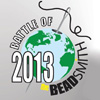
Another contest (tournament, game, fun, etc.) is coming! As it's said by Steven Weiss from The BeadSmith company, On April 1st 2013, 3 groups of 64 artists will be randomly selected. Random artist pairings will be created, establishing a first round of competition of 32 artist vs. artist "battles" in each group. (For example, Group"A" might have the work of Californian Linda Roberts "battling" against the work of Vermont's Nancy Dale, and so on.) Artists will then have until June 1st to create, a single piece of ORIGINAL beadwork, and submit four photos best highlighting their works most important elements. The 62 competitors in your group not involved in your round one "battle", and a group of 38 invited judges, will vote for the piece that best captures their imagination. A minimum of 70 votes will be enough to determine a winner, who will then move on to round two of the group competition. The public will also be invited to vote for each Battle. The general public favorite will be awarded 10 "votes". This will maintain the importance of the artist votes, while giving the public a chance to be involved throughout the competition. Each round a piece moves to is an opportunity for an artist to add one new photo to his album. It is highly reccomended to the artists to take 10-15 photos at one time to avoid the pressure to keep setting up photo sessions later on.
• Round 1: 64 Artists, 32 Battles
• Round 2: 32 Artists, 16 Battles • Round 3: 16 Artists, 8 Battles • Round 4: 8 Artists, 4 Battles • Round 5: 4 Artists, 2 Battles • Round 6: 2 Artists, 1 Battle • Winner of Group!!!
Full text of the Battle of the BeadSmith rules
|
|
Pandora and Silver beads by Michael Ivanov
Our another guest today is also a man - Michael Ivanov, an artist from Vilnius, Lithuania. Being a creative person, Michael applies skills to designing and making lampwork and sterling silver beads. Michael says, "If you experience emotions when looking at the fire, running clouds in the sky or a babbling mountain stream, it is almost always a sense of wonder. I also have such a feeling when touching "drops" of colored glass, it's magic, I do not pick up another word. Many of us in childhood during the game loved to see the world through colored pieces of broken glass because everything became strange and magical. Glass beads accompanied human civilization for thousands of years, it is an indicator of the development of crafts, welfare and trade ties. From pharaonic Egypt and to the Scandinavian Vikings, from the ancient Sarmatians to the present day glass beads are like colorful frozen droplets of time strung on a necklace of Human History. So, when I saw the work of the well known Danish lampwork artist (about 3 years ago), not knowing the basics of this craft, I fell in love with this idea and began to collect information about the tools, equipment and materials, and began to try different glass. Now I use in my work materials by Effetre (former Moretti company). I'm completely satisfied with the quality and palette of the produced by this remarkable manufacturer. It may seem a trivial form of my beads but believe me, it is not easy to make the ideal toroidal shape and meet conceived design. Small beads should properly display the palette and pattern to the person who has taken a bead in hand to get him study it for a few minutes and find new and new nuances. Lampwork is both an art and a craft. From the beginning I wanted to create my own line of glass and silver beads that the price would be affordable to a very wide range of fans and artists (from students to retirees), and the quality and design were not worse in comparison to the best samples in this area. My motto is "Find the drops of the rainbow"; I mean that any person who is not indifferent to such things is able to find interesting patterns..."
Full article by Michael Ivanov
|
|
Retro style and Retro jewelryWe know that everything new is well-forgotten old; and we often get inspired by the images from past and apply to them the term "retro". Wikipedia article states, "Retro is a culturally outdated or aged style, trend, mode, or fashion, from the overall post-modern past, that has since that time become functionally or superficially the norm once again. The use of 'retro' style iconography and imagery interjected into post-modern art, advertising, mass media, etc. It generally implies a vintage of at least 15 or 20 years. For example clothing from the 1980s or 1990s could be retro." In general, "retro" actually means "pretty old". Reading articles on jewelry by historians, we can learn something new: it turns out there is a definite jewelry style named "retro jewelry" applied to items created between approximately 1935 and 1945 (although actually up to 1950)! The name "retro" was given to this jewelry style by Francois Curiel, the head of the jewelry department for Christie's Auction House in New York in the early 1970's. Retro jewelry, or "Cocktail Jewelry" as it is sometimes called, originated in France with designs by Van Cleef & Arpels. They produced a collection of jewelry that was exhibited at the 1939 World's Fair in New York. When World War II broke out, the jewelry remained in New York, serving as a great influence to American jewelry designers throughout the remainder of the war. Retro jewelry was common in Hollywood movies and is very colorful, bold, elaborate and oversized with three dimensional use of rose, yellow and green, highly polished gold. Commonly worn pieces reflected the glamour and enchantment that Hollywood inspired during times of crisis and were large cocktail rings, bracelets, watches, necklaces, chunky and charm bracelets, big clips and brooches. There was still much uncertainty about paper money and in times of economic skepticism precious metal and gems represent portable capital. Huge deposits of gems were discovered in Brazil in the 30's as the result of geological excavations searching for industrial minerals to fuel the war, hundreds of localities became known for Brazilian deposits of gems. The most popular gemstones seen in retro jewelry are aquamarine, citrine, topaz, large cabochon-cut rubies and sapphires, golden beryl, peridot and tourmaline. Most of these gems were exceptionally large. Birds, baskets of flowers, dancers and other serene images were common motifs. Ballerinas, bows, animals, shells and hearts were also recurrent designs in jewels of the period, often accented with sprays of diamonds and twists and spirals of calibre-cut precious gems. The ribbon bow was the most popular motif, often highlighted in the center with a cut ruby or sapphire knot. Retro jewels imitate three dimensional folds of fabric, easily separating them from the two dimensional Art Deco clips or Victorian bows. The French jeweler Mauboussin had said, "The jewellery of the Forties was the jewellery of an age of crisis, so it is only logical that it should come to an end with the crisis itself." (M. Gabardi, The Jewels of 1940 in Europe, 1982) |
|
Perlen Poesie Magazine. Issue 15December 10th, 2012 - PERLEN POESIE 15 is coming out! Perlen Poesie 15 - a cheerful bead magazine!
•
Get inspired by the fresh geometric designs by the
London based artist Jean Power and bead the necklace
"Rio" in Brasilian colors.
• Be inspired by the bold shades of Mexico - a highlight is the necklace "Frida" by the artist Anja Schlotman (part 1). • Also classy festive works await you with the necklaces "Greta Garbo" and "Anam". • By the way: the issue also has something for men...
Subscribe to Perlen Poesie magazine
Buy Perlen Poesie magazine in the USA:
|
|
Upcoming events
Saturday, Dec. 8, 2012, 10am - 5pm Bead Society of Greater New York is sponsoring Holiday Craft Fair. Jewelry, accessories & much more; 50+ exhibitors. Free admission. For more information visit www.nybead.org, email at info@nybead.org or call at 212-591-1127.
December 14-16, 2012 The International Gem & Jewelry Show offers the greatest selection and lowest prices on diamonds, gold, silver, beads, and more. Choose either costume or fine jewelry from more than 350 exhibitors from around the world. |
|
Note
If you don't see the newsletter properly formatted please click here:
November Issue
|
© 2012 MyLovelyBeads.com All Rights Reserved.
If you do not want receive our newsletter and you wish to remove your email address from our mailing list, please click the following link to unsubscribe.



